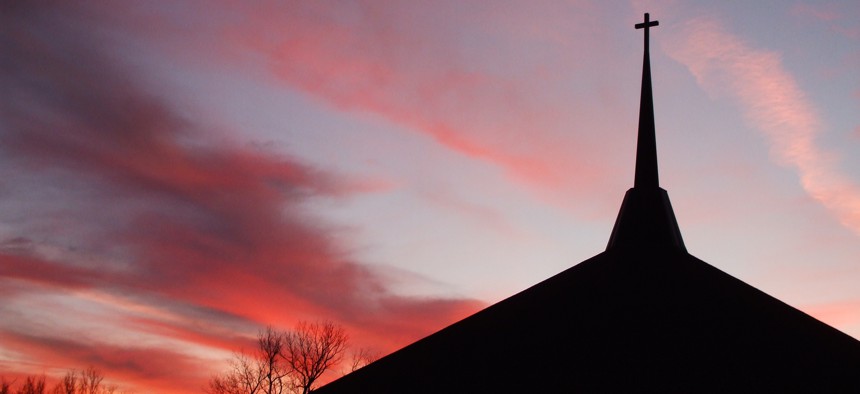Ahead of Easter Sunday, Kansas Lawmakers Revoke Governor's Restrictions on Church Gatherings

Shutterstock
Gov. Laura Kelly had issued an order earlier this week prohibiting crowds of more than 10 people at religious services as part of efforts to combat the spread of the coronavirus.
Republican state lawmakers in Kansas on Wednesday tossed out restrictions on religious gatherings with more than 10 attendees that the state’s Democratic governor laid out the day before as part of efforts to stop the spread of the deadly coronavirus.
This reversal came just days before Easter, which is this Sunday. Gov. Laura Kelly signed an executive order on Tuesday that included prohibitions on a wide range of public and private gatherings with more than 10 people—church and religious services among them.
A panel known as the Legislative Coordinating Council, which is led by Kansas House Speaker Ron Ryckman and Senate President Susan Wagle, who are both Republicans, met Wednesday and voted 5-2 along party lines to revoke the order.
GOP lawmakers opposed to the governor’s directive raised concerns that churches were being treated differently than other types of non-secular establishments and that the order infringed on people’s constitutionally protected religious freedoms.
"My phone’s been ringing off the wall. It appears to be out of line and extreme, and clearly in violation, a blatant violation, of our fundamental rights," Wagle said.
Wagle added that she’d heard from people who were upset over the measure not because they were necessarily planning on attending upcoming church services, but because they think it's inappropriate for the governor to tell them that they cannot worship as they choose.
Earlier in the day, the state’s attorney general, Derek Schmidt, said that the part of the governor’s order restricting in-person religious gatherings was sound public health advice that Kansans should follow amid the pandemic.
But he also suggested that it likely violated the state constitution and other legal protections and advised that authorities should not enforce it with arrests, fines or other measures. Schmidt’s views were outlined in a memorandum issued by his office.
Kelly in a press conference on Wednesday said that the AG’s memo was “unusual” and “unwarranted” and had injected confusion into the current situation surrounding the virus.
She also called the move by the GOP lawmakers “irresponsible” and said her administration was exploring next steps to respond to their revocation of the order. The governor didn’t rule out going to court. “Nothing is off the table,” she said.
“There are real life consequences to the partisan games Republican leaders played today and I simply cannot stand for it,” Kelly added.
Across the country, religious services have been a point of tension as state and local leaders seek to restrict large gatherings to help halt spread of the disease. Some pastors have resisted, continuing to hold services, even resulting in citations and at least one arrest in a high-profile Florida incident.
Other religious organizations have improvised, with some conducting services and other activities online, and others holding drive-in services in parking lots with congregants in their vehicles.
Kansas now has about 1,000 confirmed cases of the coronavirus and there have been at least 38 deaths due to the illness that the virus causes. Officials in the state in recent days have linked at least three “clusters” of cases to church gatherings.
The 10-person rule as it applied to religious gatherings did not count people like preachers and choir performers who are involved in putting on church services, as long as those people were adhering to safety protocols like keeping distance between one another.
At the time she signed the order, Kelly said that Kansas was rapidly approaching its projected peak infection rate from the virus in the coming weeks. She also said that there was an especially dangerous risk of a spike in cases occurring through church gatherings.
“This was a difficult decision,” she said in a statement, referring to the now-overturned order. “Not one I was hoping to have to make.”
OTHER STORIES on Route Fifty:
NEXT STORY: Stay-At-Home Orders Can Be Dangerous for Victims of Domestic Violence. But Help Is Still Available.






